MercoPress. South Atlantic News Agency
Tag: Uruguay
-
Wednesday, February 6th 2019 - 09:22 UTC
“Neutral” Uruguay's name mentioned in attempts to drain Venezuelan coffers

A bank in Portugal has blocked Venezuela’s attempt to transfer US$ 1.2 billion to Uruguay, a lawmaker said on Tuesday as the opposition to President Nicolas Maduro warned of the theft of public funds, while the United States sent food and medical aid to the Venezuelan-Colombian border.
-
Saturday, January 26th 2019 - 20:02 UTC
USA at the UN: Countries should support transition in Venezuela; Russia denounces interventionist acts
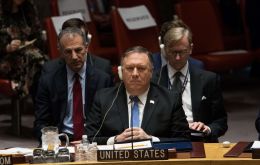
The Security Council convened by the United States this Saturday to discuss the institutional and political crisis that Venezuela is experiencing has been lifted this afternoon. With a strongly polarized participation, the bloc that supports the transitional government of Juan Guaidó with the US at the head, faced the block that recognizes as legitimate the regime of Nicolás Maduro, headed by Russia and China. Latin American countries also expressed their positions, describing the case as a crisis that directly affects the region.
-
Saturday, January 26th 2019 - 08:48 UTC
Guaidó rejects dialogue offer from Maduro; UN Security Council to address the Venezuela situation on Saturday
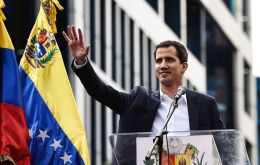
Venezuelan opposition leader Juan Guaidó has rejected an offer of talks from President Nicolás Maduro amid an ongoing power struggle between the two. Guaidó declared himself “acting president” on Wednesday, a position that has been recognized by several countries, including the US, Canada, the Lima Group and some EU members, but not the EU as a block..
-
Friday, January 25th 2019 - 15:53 UTC
Venezuela: Russia offers to mediate between Maduro and the transition government
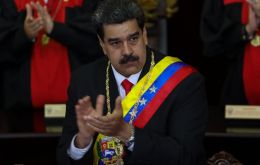
Russia joined on Friday to countries that offered to safeguard peaceful mediation between the government of President Nicolás Maduro and the President of the National Assembly, proclaimed interim president of Venezuela, Juan Guaidó. The government of Vladimir Putin said that they are prepared to cooperate with all global forces acting responsibly, RIA news agency reported.
-
Friday, January 25th 2019 - 08:45 UTC
UK praises Uruguay's human rights record, but also has recommendations

United Kingdom welcomed Uruguay’s positive record in promoting freedom of expression and independent media, as well as its progressive legislation particularly in promoting gender equality and LGBT rights.
-
Thursday, January 24th 2019 - 09:35 UTC
Guaido recognized as interim president by Lima Group and US; Uruguay and Mexico call for negotiations
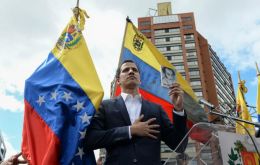
Most Latin American nations recognized Venezuelan opposition leader Juan Guaido as interim president on Wednesday, leaving Nicolas Maduro ever more isolated as he faces unrest at home and threats from the United States.
-
Saturday, January 19th 2019 - 09:22 UTC
Extreme wet January displaces thousands and floods farmland in Mercosur member countries
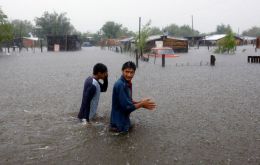
Intense rainfall in northeast Argentina and neighbouring areas in Mercosur members has caused devastating floods, amplifying the economic burdens of Argentina's recession. Over 5,000 people have evacuated the region, and millions of hectares of crops have been sent underwater.
-
Monday, January 14th 2019 - 18:06 UTC
Uruguay: “Deep concern” about detention of the Venezuelan Parliament president
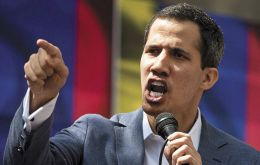
The Ministry of Foreign Affairs expressed on Monday, through a statement, its “deep concern” regarding the “serious institutional crisis” and the “acts of intimidation” that led to the arrest and subsequent release of the president of the National Assembly of Venezuela, Juan Guaidó , by officials of the Bolivarian National Intelligence Service (Sebin).
-
Saturday, January 12th 2019 - 11:12 UTC
Venezuela in conflict of powers: Maduro took office, but Guaidó shows as president while Venezuelans protest
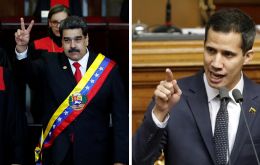
It seemed sure that, starting January 10, Venezuela would experience high uncertainty. Nicolás Maduro swore in the presidency for the 2019-2015 government period in front of the Supreme Court of Justice (TSJ), when the constitution of that country dictates that it is before Parliament that the president must present the inauguration. Both the international community and the National Assembly (AN), declared in contempt by the Supreme Court, mark Maduro as an usurper. The illegitimacy of the president is discussed globally and Juan Guaidó is recognized as interim president of the Republic.
-
Thursday, January 10th 2019 - 10:03 UTC
Claims of Uruguayan ruling coalition involvement in money laundering with Chavista regimes

Uruguay and Bolivia will be the only South American countries attending this Thursday the inauguration of Venezuela's Nicolas Maduro for a second five year mandate. A regime which has become an increasingly international pariah for its non democratic practices, human rights abuses, and disastrous management of the economy creating a major humanitarian crisis with food and essential pharmaceutical shortages while some three million of Venezuelans have fled the country in desperation.
